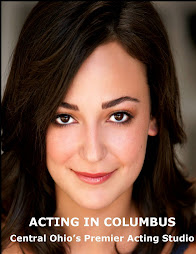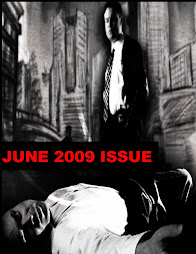skip to main |
skip to sidebar




PHOTO: Joe J.
Acting in Columbus is a professional training studio in Columbus, Ohio which offers small and practical acting classes in a supportive yet challenging environment.
WELCOME TO ACTING IN COLUMBUS

Acting in Columbus is a professional training studio in Columbus, Ohio which offers small and practical acting classes in a supportive yet challenging environment. We offer classes for adults in Scene Study, On-Camera, Improv, Acting for Film and Master classes. We're also offering an On-Camera Workshop for young performers and their parents. With our small class sizes; you receive personal attention from our faculty - all working, professional actors and directors.
WHY ACTING IN COLUMBUS?
Prospective students frequently ask us what differentiates us from other acting classes. We answer that question by sharing what kind of work our students are booking. Your acting class will consist of no more than 12 students who will discover together that acting is probably the most challenging and thrilling thing they've ever done.
What we do, we do very, very well!
ACTING FOR TV COMMERCIALS SUNDAY AUGUST 2, 2009 1:00-8:00PM $200
INTRODUCTION TO ACTING FOR THE CAMERA
Learn how to audition for and break into the local commercial and industrial industry. If you already have an agent but want to increase your "Bookability" this workshop will give you the edge over your competitors! This workshop will give you:
• Experience with the actual audition process: You'll work on-camera all day doing both prepared and cold readings, and receive plenty of feedback from instructor Richard Mason• Script analysis skills: We have written our own textbook that breaks this process down and makes it simple• Comfort in front of the camera: How do you stand? How do you hold the script? How do you deal with your partner and the camera at the same time? What is a slate? What do you do with your hands?• Practice at doing all types of commercials: Scene work, improv, one-liners, bite and smiles, handling products, etc.• How to get started: This is our "Intro to the World of Camera Acting" class. It includes our "How Does This Business Really Work?" Seminar. You will learn how to make the first contact with the agents, and all the follow-ups you will need to "Break In". You'll also learn how to market to the casting directors, all about pictures and resumes, how the unions work, etc.
By taking this class you have the opportunity to show the agents that you are serious about pursuing this type of work. It also allows them to be more confident in submitting you, because they know you'll be able to handle yourself in front of the camera. Being a good commercial actor requires many things, including strong acting skills, a solid work ethic, and lots of hard work. This class is a good first step toward acquiring those things and being successful. Enrollment in this workshop also includes three months of Career Management. This Workshop is limited to 12 students.
TERMS YOU SHOULD KNOW

Audition. A formally arranged session (usually by appointment through an agent) for an actor to display his or her talents when seeking a role in an upcoming production of a play, film or television project.
Back to One! The verbal cue for performers to return to the mark where they started the scene.
Blocking. Working out the physical movements of performers and/or camera in a scene.
Boom. The apparatus that holds the microphone above the actor. Also, a camera direction when the camera is mounted on a crane as in "boom up," to raise the camera.
Breakdown. A listing of all roles in a production, from largest to smallest, with a description of each character including, for the smaller roles, how many scenes and lines the character has.
Best Boy. The assistant to the Chief Electrician, or Head Gaffer.Blocking. The actual physical movements by performers in any scene. Also can refer to the movements of the camera.
Booking. A firm commitment to a performer to do a specific job.
Blue Screen. Shooting in a studio against a large blue or green backdrop, which allows a background to be superimposed later on the final image.
Call. The exact time at which an actor or crew member is to report to a set.
Callback. A second audition where an actor is either presented to the producer and director or, in the case of commercials, is filmed on tape again for final consideration.
Camera Rehearsal. Also called a "walk-through," this is where actors will walk through their blocking so that the camera can rehearse its moves.
Cold read. Cold reading is a term used by actors in theatre, television, film, and performance fields. A cold reading is a reading out loud from a script/side without any rehearsal or study in advance. This is generally required in auditions and casting calls.
Continuity. A very important part of film making, this is the process of ensuring that the visual aspects of a production are consistent from one take to the next. The CONTINUITY person often takes Polaroid snapshots of principals and featured extras in order to check later for inconsistencies.
Demo Reel. This is a sample video tape (there are demo tapes for voiceover) of your previous work. Your demo real should display your versatility. When creating your demo, try and keep it short, up to 5 minutes of clips showing the many types of characters you can portray.
Extra. A non-speaking part, background or atmosphere. Extra work is a terrific way to begin your education in the film industry and resume preparation. Extras are generally paid to hang around in the background of a scene to make the shot more realistic. Sometimes extras get singled out to perform more than just background, perhaps you may get a speaking part or more on camera time.
Honey Wagon. The trailer or RV that contains dressing rooms and bathrooms for actors.Monologue. A speech used by an actor to demonstrate his or her ability at an audition.
Principle. This is what most actors are striving for, a main character in a project. One with lines, on camera time and better salary. A major part of the film or project.
Scene Study and Analysis. A pre-audition practice of studying a few pages of a script ahead of time.
Sides. Designated scenes pulled out of an entire script to be used for auditions.
Slate. The act of stating your name and agency on a commercial audition while being videotaped.
Talent. A term that refers to all ABOVE-THE-LINE personnel, but specifically to the actors. Sometimes this term is used by agents and casting directors to mean "actors."
Back to One! The verbal cue for performers to return to the mark where they started the scene.
Blocking. Working out the physical movements of performers and/or camera in a scene.
Boom. The apparatus that holds the microphone above the actor. Also, a camera direction when the camera is mounted on a crane as in "boom up," to raise the camera.
Breakdown. A listing of all roles in a production, from largest to smallest, with a description of each character including, for the smaller roles, how many scenes and lines the character has.
Best Boy. The assistant to the Chief Electrician, or Head Gaffer.Blocking. The actual physical movements by performers in any scene. Also can refer to the movements of the camera.
Booking. A firm commitment to a performer to do a specific job.
Blue Screen. Shooting in a studio against a large blue or green backdrop, which allows a background to be superimposed later on the final image.
Call. The exact time at which an actor or crew member is to report to a set.
Callback. A second audition where an actor is either presented to the producer and director or, in the case of commercials, is filmed on tape again for final consideration.
Camera Rehearsal. Also called a "walk-through," this is where actors will walk through their blocking so that the camera can rehearse its moves.
Cold read. Cold reading is a term used by actors in theatre, television, film, and performance fields. A cold reading is a reading out loud from a script/side without any rehearsal or study in advance. This is generally required in auditions and casting calls.
Continuity. A very important part of film making, this is the process of ensuring that the visual aspects of a production are consistent from one take to the next. The CONTINUITY person often takes Polaroid snapshots of principals and featured extras in order to check later for inconsistencies.
Demo Reel. This is a sample video tape (there are demo tapes for voiceover) of your previous work. Your demo real should display your versatility. When creating your demo, try and keep it short, up to 5 minutes of clips showing the many types of characters you can portray.
Extra. A non-speaking part, background or atmosphere. Extra work is a terrific way to begin your education in the film industry and resume preparation. Extras are generally paid to hang around in the background of a scene to make the shot more realistic. Sometimes extras get singled out to perform more than just background, perhaps you may get a speaking part or more on camera time.
Honey Wagon. The trailer or RV that contains dressing rooms and bathrooms for actors.Monologue. A speech used by an actor to demonstrate his or her ability at an audition.
Principle. This is what most actors are striving for, a main character in a project. One with lines, on camera time and better salary. A major part of the film or project.
Scene Study and Analysis. A pre-audition practice of studying a few pages of a script ahead of time.
Sides. Designated scenes pulled out of an entire script to be used for auditions.
Slate. The act of stating your name and agency on a commercial audition while being videotaped.
Talent. A term that refers to all ABOVE-THE-LINE personnel, but specifically to the actors. Sometimes this term is used by agents and casting directors to mean "actors."
ARCHIVED NEWSLETTERS

VISIT OUR WEBSITE FOR MORE INFORMATION

PHOTO: Joe J.
To register for classes and workshops at ACTING IN COLUMBUS click on this link:
http://actingincolumbus.net/page008.aspx
CONTACT US:
PHONE: 614-455-0881
EMAIL: actingincolumbus@yahoo.com
WEBSITE: http://actingincolumbus.net
http://actingincolumbus.net/page008.aspx
CONTACT US:
PHONE: 614-455-0881
EMAIL: actingincolumbus@yahoo.com
WEBSITE: http://actingincolumbus.net






